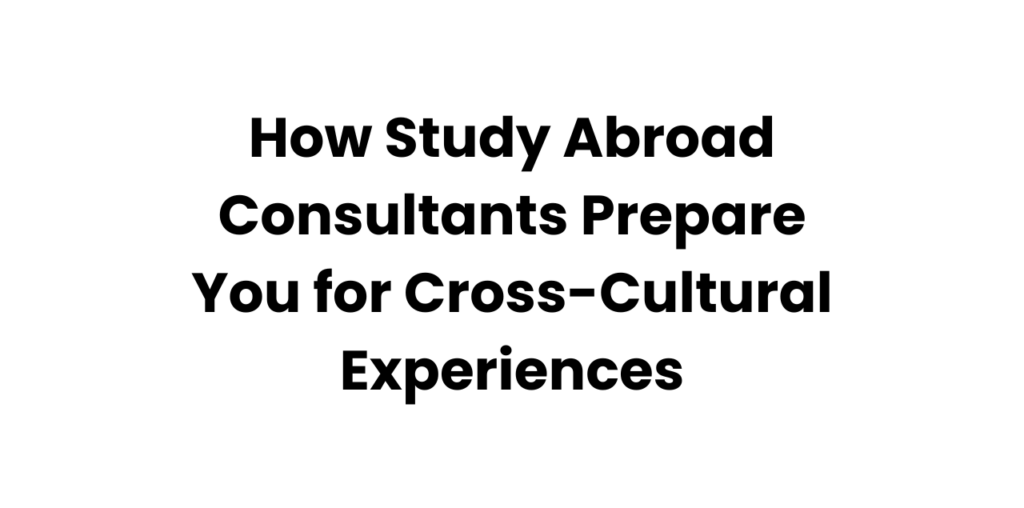Studying abroad is an exciting journey that opens doors to new cultures, perspectives, and opportunities. However, the transition can also be challenging, especially when navigating unfamiliar cultural landscapes. This is where a study abroad consultant plays a pivotal role, guiding students to not only secure admissions but also prepare for the cross-cultural experiences that lie ahead. Cross-cultural preparation is essential for a smooth and enriching experience abroad, and consultants ensure that students are well-equipped to thrive in diverse environments.
Understanding Cross-Cultural Preparation
When you decide to study abroad, the excitement of moving to a new country is often mixed with apprehension about cultural differences. From language barriers and social norms to academic expectations and lifestyle changes, adapting to a new culture can be overwhelming. A study abroad consultant provides invaluable insights into the host country’s culture, helping students to better understand what to expect and how to navigate these differences.
Cross-cultural preparation is about more than just learning etiquette or language—it’s about fostering a mindset of openness, respect, and adaptability. Consultants understand this and offer tailored advice that helps students embrace these changes with confidence.
Importance of Cultural Awareness
One of the first things a study abroad consultant helps you understand is the importance of cultural awareness. This refers to recognizing and respecting cultural differences while maintaining a non-judgmental attitude. Every culture has its unique values, traditions, and social structures, and students who are aware of these nuances are better equipped to avoid misunderstandings and integrate smoothly into their new environment.
Consultants offer pre-departure training, providing detailed overviews of the cultural norms in the host country. Whether it’s the academic expectations in the UK or the social etiquette in Japan, having this knowledge beforehand can ease the transition significantly.
Language Barriers and Communication Skills
One of the most significant challenges students face when studying abroad is the language barrier. Even in countries where English is spoken, accents, colloquialisms, and regional dialects can pose difficulties. A study abroad consultant helps students prepare by recommending language courses, practice materials, and immersion techniques. They often connect students with language support resources in the host country, ensuring that communication doesn’t become an obstacle.
Beyond language proficiency, effective communication in a cross-cultural setting involves understanding non-verbal cues, tone, and context. Consultants guide students on how to interpret body language and navigate conversations with people from different cultural backgrounds.
Academic Expectations and Adaptation
Academic systems vary significantly across countries, and adjusting to these differences is crucial for success. From teaching styles to grading systems, students must be prepared for how education functions in their chosen destination. A study abroad consultant provides insights into the academic culture of the host country, preparing students for what lies ahead.
For example, studying in the UK often involves independent research, critical thinking, and active participation in discussions. Meanwhile, in countries like Japan, the focus may be more on memorization and classroom discipline. By understanding these differences, students can adapt more easily to the expectations and excel academically.
Social Integration and Building Relationships
Making friends and forming social connections is one of the most rewarding aspects of studying abroad, but it can also be daunting in an unfamiliar culture. A study abroad consultant advises students on how to break down social barriers and build relationships with locals and other international students.
They often provide practical tips on attending cultural events, joining clubs or societies, and participating in local activities. These experiences not only enhance the study abroad journey but also promote deeper cultural immersion, allowing students to form meaningful relationships that can last a lifetime.
Navigating Cultural Shock
Even with the best preparation, cultural shock is a common experience for many students. It refers to the feelings of confusion, frustration, or homesickness that arise when adjusting to a new culture. A study abroad consultant helps students recognize the signs of cultural shock and provides strategies to manage it effectively.
Consultants recommend ways to stay connected with home while embracing the new culture. They offer support in finding comfort in routines, connecting with other expatriates, and seeking professional help if needed. This support is crucial in ensuring that students maintain their mental well-being during this transformative experience.
Enhancing Cultural Competence
Cultural competence is the ability to effectively interact with people from different cultural backgrounds. It goes beyond understanding cultural norms and involves developing empathy, adaptability, and problem-solving skills in cross-cultural contexts. A study abroad consultant plays a key role in helping students cultivate cultural competence by providing them with the tools they need to interact respectfully and effectively in diverse settings.
Through workshops, seminars, and one-on-one counseling, consultants expose students to real-life scenarios they might encounter abroad. This preparation helps students become more culturally competent, which is an essential skill not only for personal growth but also for professional success in today’s globalized world.
Practical Tips for Daily Life
Daily life abroad can be filled with small yet significant cultural differences. From grocery shopping and public transportation to tipping practices and holiday traditions, adapting to these differences can take time. A study abroad consultant helps students navigate these practical aspects of living abroad, offering advice on everyday challenges that might arise.
For example, consultants might provide guidance on how to set up a bank account, find affordable housing, or access healthcare services in the host country. These practical tips help students feel more comfortable and prepared as they embark on their study abroad adventure.
Support Systems and Resources
Studying abroad can be a daunting experience, but students don’t have to face it alone. A study abroad consultant ensures that students are aware of the support systems and resources available to them, both before and after their arrival. Whether it’s connecting students with international student organizations, providing information on counseling services, or offering career guidance, consultants make sure that students have access to the help they need at every step of their journey.
Many consultants also maintain a network of alumni who have studied in similar destinations. These alumni can offer invaluable firsthand advice and support, helping current students adjust to life abroad.
Preparing for a Global Career
In addition to personal growth, studying abroad is an excellent way to prepare for a global career. A study abroad consultant helps students leverage their international experience to enhance their employability. By providing career counseling, networking opportunities, and tips on how to showcase cross-cultural skills to potential employers, consultants ensure that students are prepared for the global job market.
They also advise on internship opportunities, volunteer work, and other experiences that can boost a student’s resume and provide practical experience in their field of study. This career-focused guidance helps students make the most of their time abroad and sets them up for success in the future.
Conclusion
Studying abroad is a life-changing experience, filled with opportunities for academic, personal, and professional growth. However, navigating the cultural differences in a foreign country can be challenging without proper guidance. This is where a study abroad consultant becomes invaluable, providing the support, resources, and insights needed to thrive in a cross-cultural environment.
From preparing for cultural differences and overcoming language barriers to managing cultural shock and enhancing cultural competence, a study abroad consultant equips students with the tools they need to succeed. With their expert advice, students are not only prepared to excel academically but also ready to fully immerse themselves in the rich cultural experiences that studying abroad offers. This preparation ensures that students can make the most of their time abroad and return home with a deeper understanding of the world and a broader perspective on life.




